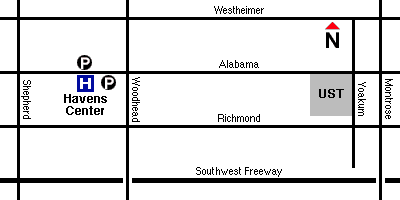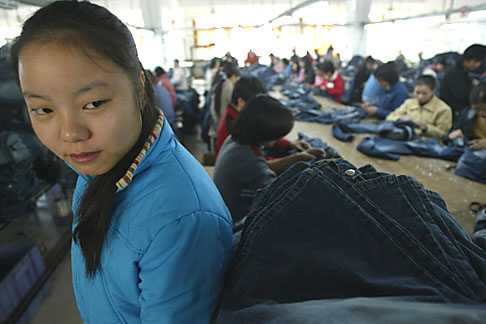and the Havens Center Present
Topical Films and Discussions
Free and Open to the Public
All films 7:00pm (unless otherwise noted)
Havens Center - 1827 W. Alabama St, Houston, Texas 77098
|
Havens Center is located about 1/4 mile east of Shepherd on W. Alabama Street, on the south side of the street at 1827. Parking is available at St Stephens Episcopal Church (on the south side of the street near Woodhead and Alabama) or in the parking lot directly across the street from Havens Center (on the north side of Alabama). |

|

Saturday, March 3
China Blue, 2006, 88mins
Directed by Micha X. Peled
A clandestinely shot, deep-access account of how the clothes we buy are actually made.
Like no other film before, China Blue is a powerful and poignant journey into the harsh world of sweatshop workers. Shot clandestinely, this is a deep-access account of what both China and the international retailers don't want us to see: how the clothes we buy are actually made.
Following a pair of denim jeans from birth to sale, China Blue links the power of the U.S. consumer market to the daily lives of a Chinese factory owner and two teenaged female factory workers. Filmed both in the factory and in the workers' faraway village, this documentary provides a rare, human glimpse at China's rapid transformation into a free market society.
Saturday, March 10
Who's Counting: Marilyn Waring on Sex, Lies and Global Economics, 1996, 94mins
Produced by The National Film Board of Canada
Marilyn Waring is the foremost spokesperson for global feminist economics, and her ideas offer new avenues of approach for political action. With persistence and wit she has succeeded in drawing attention to the fact that GDP has no negative side to its accounts - such as damage to the environment - and completely ignores the unpaid work of women. "Why is the market economy all that counts?" Ms. Waring asks.
In 1975, when she was just 22 years old, she was elected to the New Zealand parliament. She was re-elected three times and eventually brought down the government on the issue of making New Zealand a nuclear free zone. When she was chairperson of the Public Expenditures Committee, she perfected what she calls the "art of the dumb question." Ever since she has challenged the myths of economics, its elitist stance, and our tacit compliance with political agendas that masquerade as objective economic policy.
Saturday, March 24
Women of Latin America Series
Mexico: Rebellion of the Weeping Women, 1992, 61mins
This is the story of Mexican women who have fought, and continue to fight, for equality and women's rights. They are women looking for children kidnapped during political pogroms, journalists, writers, and political activists. Machismo and the resulting sexism, as well as Catholicism and its perpetuation of the myth of the Virgin Mary as the standard for feminine behavior, are discussed as social factors contributing to the continued subjugation of Mexican women.
Ecuador: The Indigenous Woman, 1997, 57mins
Isolated in jungles, or crowded into large cities, Latin American Indians constitute the most exploited sector of society. This program traces the harsh life of indigenous women from several tribes, including the Otavalan, Puruha, and Quechua of Ecuador, from pre-Columbian times to the present. Topics discussed include rape as an ongoing practice; labor exploitation; the effects of acculturation; and racial and sexual discrimination.
Saturday, March 31
The Revolution Will Not Be Televised, 2003, 74mins
Directed by Kim Bartley and Donnacha O'Briain
Sponsored by Houston Peace and Justice Center
The Revolution Will Not Be Televised (or Chávez: Inside the Coup) is a documentary about the coup attempt against elected Venezuelan President Hugo Chávez in April 2002. Shot by two independent filmmakers who happened to be inside the presidential palace filming a documentary for Irish television about Chávez when the coup occurred, The Revolution Will Not Be Televised documents the events occurring over the two days during which Chávez was detained by coup leaders and his restoration to power after a massive popular outcry. The film highlights the misinformation about the coup disseminated by the five private television stations in Venezuela owned by opponents of the Chávez administration, U.S. State Department officials, and then-White House Press Secretary Ari Fleischer. In light of both the increasingly heightened rhetoric of the Bush administration decrying President Hugo Chávez as an autocratic whose hegemonic designs threaten the rest of Latin America as well as the U.S., and the strong evidence of U.S. complicity in and support for the coup attempt, this inside account of the April 2002 coup events provides important information for concerned citizens of the U.S. and of the world.
Saturday, April 14
Thirst, 2004, 62mins
Directed by Alan Snitow and Deborah Kaufman
Thirst offers a piercing look at the global corporate drive to control and profit from water. Is water part of a shared "commons", a human right for all people? Or is it a commodity to be sold and traded in a global marketplace? Thirst tells the stories of communities in Bolivia, India, and the United States that are asking these fundamental questions, as water becomes the most valuable global resource of the 21st Century.
Global Banquet, 2001, 50mins
Directed by Ann Macksoud and John Ankele
Details how several large multi-national corporations have come to dominate the food production business, driving small family farmers both in the US and developing world out of existence, controlling markets, destroying the ability of developing nations to feed themselves and perpetuating the structures which promote poverty and hunger.
Saturday, April 21
The Power of Community - How Cuba Survived Peak Oil, 2004
Directed by Faith Morgan; Written and Produced by Faith Morgan, Eugene "Pat" Murphy and Megan Quinn
The independent documentary was inspired when Faith Morgan and Pat Murphy took a trip to Cuba through Global Exchange in August, 2003. That year Pat had begun studying and speaking about worldwide peak oil production. In May, Pat and Faith attended the second meeting of The Association for the Study of Peak Oil and Gas, a European group of oil geologists and scientists, which predicted that mankind was perilously close to having used up half of the world's oil resources. When they learned that Cuba underwent the loss of over half of its oil imports and survived, after the fall of the Soviet Union in 1990, the couple wanted to see for themselves how Cuba had done this.
During their first trip to Cuba, in the summer of 2003, they found what Cubans call "The Special Period" astounding and Cuban's responses very moving. Faith found herself wanting to document on film Cuba's successes so that what they had done wouldn't be lost. Both of them wanted to learn more about Cuba's transition from large farms and plantations, and reliance on fossil-fuel-based pesticides and fertilizers, to small organic farms and urban gardens. Cuba was undergoing a transition from a highly industrial society to a sustainable one. Cuba became, for them, a living example of how a country can successfully traverse what we all will have to deal with sooner or later, the reduction and loss of finite fossil fuel resources.
Radically Simple, 2005, 35mins
Directed by Jan Cannon
Imagine that you are first in line at a potluck supper. The spread includes not just food and water, but all the materials needed for shelter, clothing, healthcare, and education. How do you know how much to take? How much must you leave for your neighbors behind you - not just the 6 billion human beings, but our fellow creatures and the yet-to-be-born? In the face of looming ecological disaster, many people feel the need to change their own lifestyle as a necessary step in transforming our unsustainable way of life. But it's the first step that is often the most intimidating.
In Radically Simple, we join engineer and author Jim Merkel as he presents his views on sustainable living in public presentations and workshops at his home. These meetings, which revolve around discussions on global economics and resource consumption, show Merkel leading by example. He demonstrates that a radically simple lifestyle - while at times intimidating - is not only possible but extremely satisfying.
Radically Simple is a practical, personal answer to the challenge laid down by Al Gore in An Inconvenient Truth that will appeal as much to "cultural creatives" and students as to policymakers and sustainability professionals.
Stay tuned; more film dates to be announced
Argentina - Hope in Hard Times with Juan Peron
PAST FILMS
Fall 2006 at Havens Center
World Cultures, University of St. Thomas
Baker Institute, Rice University
Bauer College of Business, University of Houston
Argentina - Hope in Hard Times (Feb. 2006)
Altar for Emma Tenayuca Film Series
Argentina - Hope in Hard Times (Feb. 2005)
More Past Films
Houston Institute for Culture is a 501(c)(3) non-profit organization dedicated to promoting cultural education and awareness through cultural activities. Our goal is to provide free and low-cost events, services and classes for the community. The organization's sphere of interest is Houston, the regions that have affected Houston's cultural history and the international origins of Houston's diverse population.
HOUSTON INSTITUTE FOR CULTURE SEARCH info@houstonculture.org